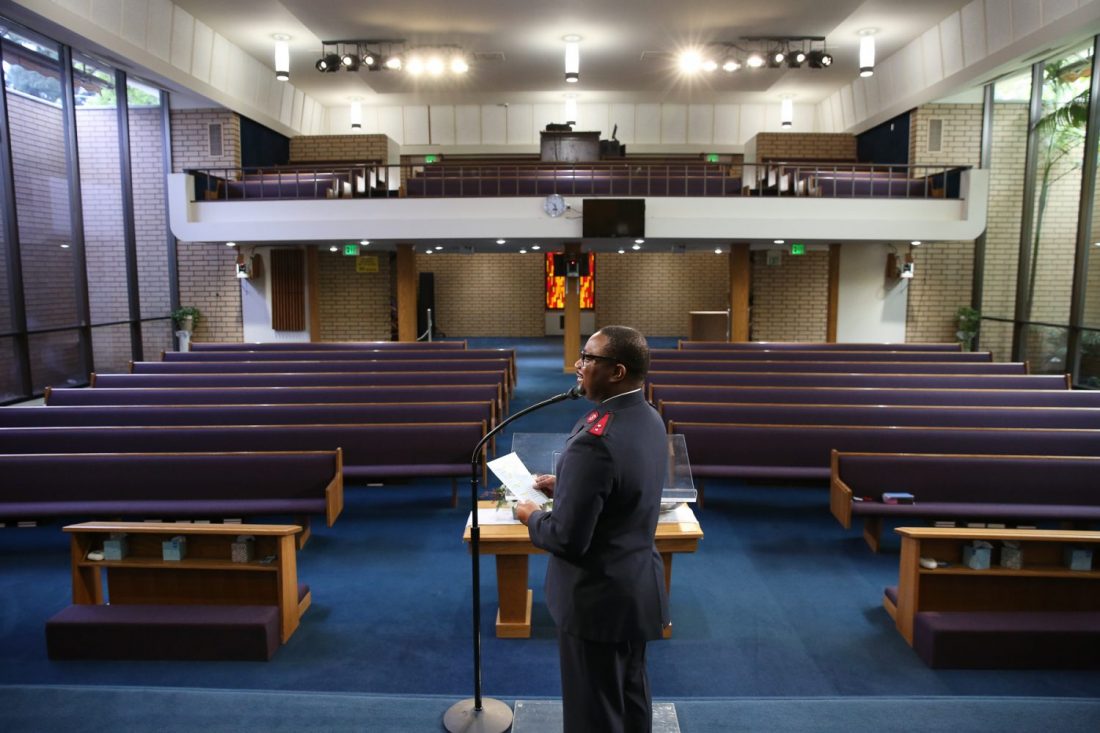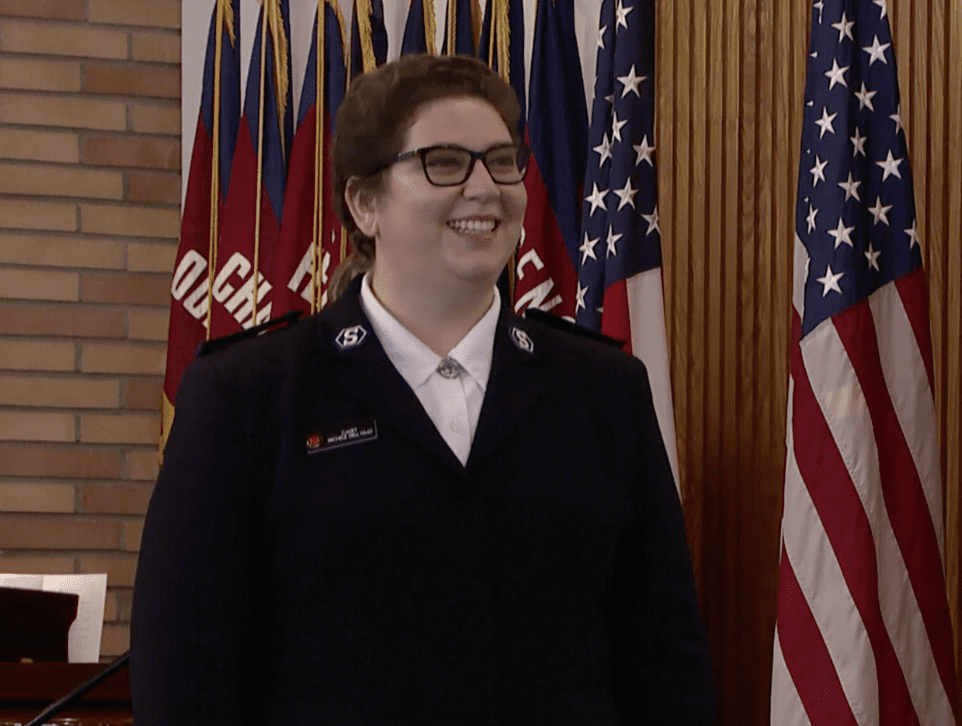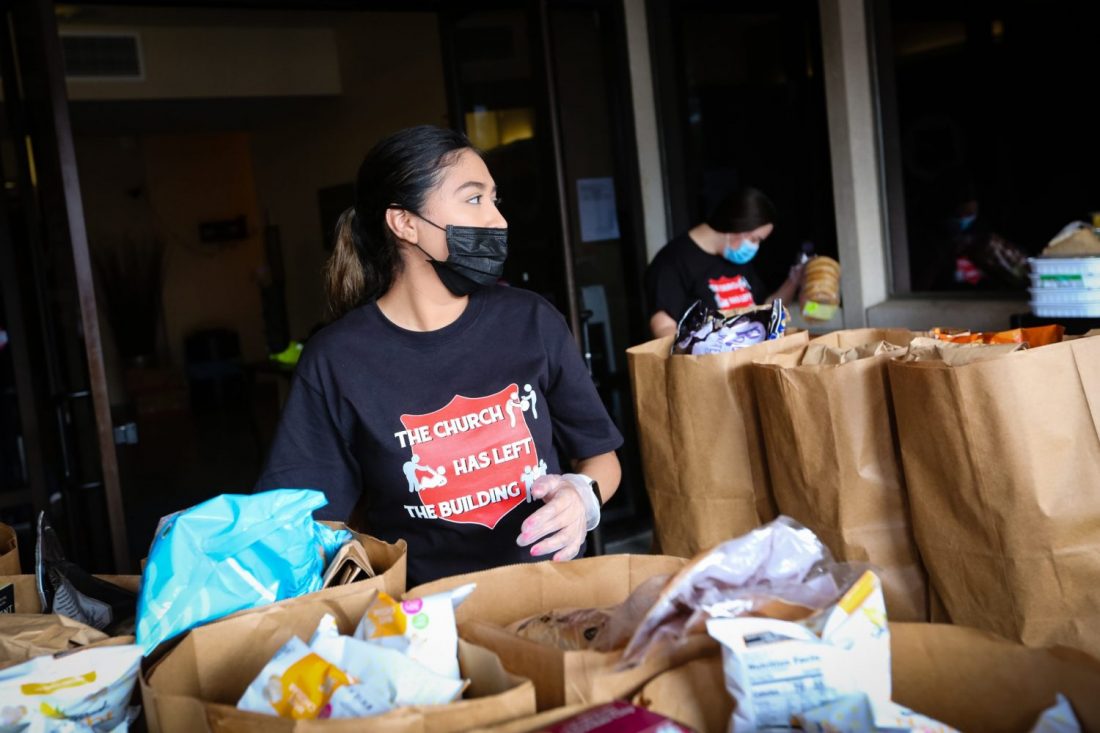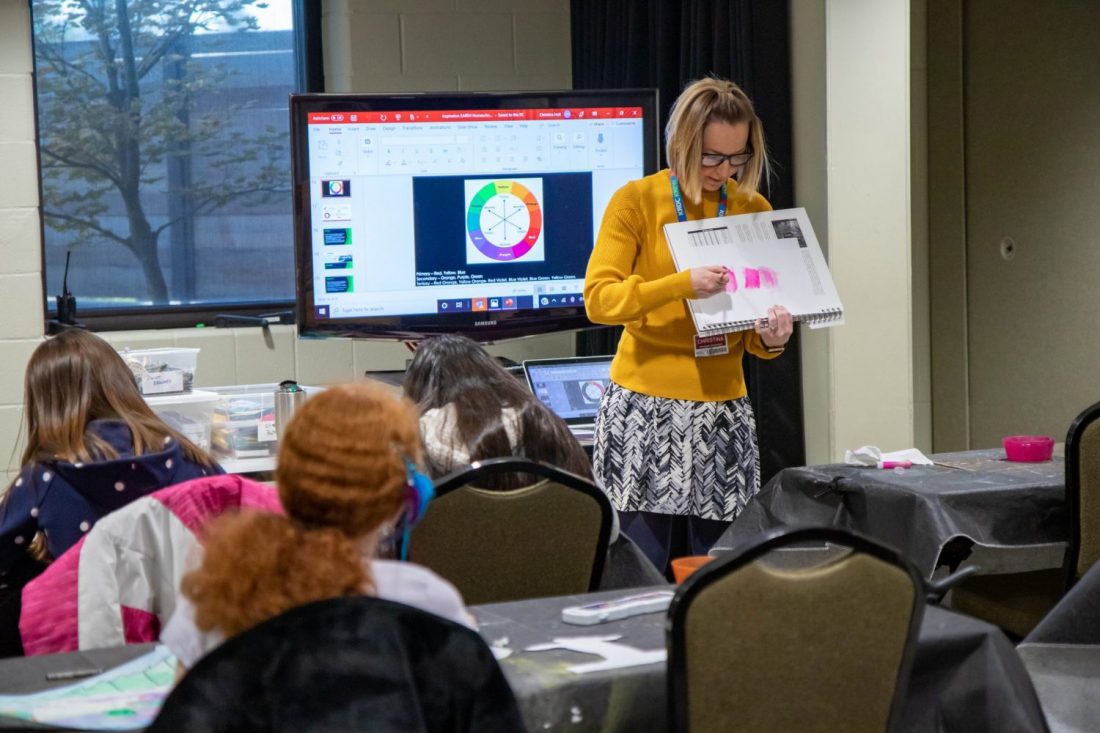Listen to this article
Listen to this article
Loading
Play
Pause
Options
0:00
-:--
1x
Playback Speed- 0.5
- 0.6
- 0.7
- 0.8
- 0.9
- 1
- 1.1
- 1.2
- 1.3
- 1.5
- 2
Audio Language
- English
- French
- German
- Italian
- Spanish
Open text
meet the helpers: learning how to change course and pastor on. while chapels and pews are empty at the moment due to social distancing restrictions, salvation army corps across the west are holding online worship services to support emotional and spiritual needs. pastoring during covid-19 is more than creating an online message, however, and we caught up with pasadena tabernacle corps (california) officer captain terry masango to learn more about how his service has shifted in the midst of covid-19. what has it been like for you in this pandemic? firstly, i would say we’ve never experienced anything like this before, and for me it’s been difficult. it’s been the ride of my life. particularly at the beginning, things were changing so fast. we were watching the news, listening to the local government, the federal government, but also the salvation army. we were looking for information; we were listening for how we are to adapt to what’s going on. so, it’s been like flying—the best example i can give you is flying—at 30,000 feet, with a plane that has holes, and you’re trying to patch the holes while it’s flying, while making sure that everyone is safe—the staff, trying to make sure people don’t lose their jobs, but also that we have enough food, enough resources to serve people that are coming and also trying to take care of my family and myself, my own health. all of that has been a challenge. what are the most pressing needs you are seeing now on the frontlines of service? we have seen a 75 percent increase in the number of people seeking our services. most of them are new families, whose breadwinners have either recently lost their jobs or are on furlough. so, most of our pressing needs are monetary donations that help us purchase the specific foods in the quantities that we need. second, non-perishable food donations and frozen goods. frozen goods, like pizza, vegetables, fruits, meals, burritos and fish are in demand. non-perishable goods, including pasta, rice, quinoa, lentils, peas, beans, flour, sugar, crackers, snack bars, chips, pretzels, cookies, nuts, tea, coffee, canned beans, vegetables, meat, noodles, soups, stews and tuna are also appreciated. other items that are helpful, include baby food, formula, condiments, hygiene kits and socks. how do you handle the emotional stress load of covid-19? what do you say to those who might be afraid? to handle the emotional stress, we must accept firstly that we are all struggling, we are all trying to comprehend what’s happening; it’s like the ground under us is shaking and everyone is trying to survive. so personally, how i’ve been able to handle the pressure is through prayer; i’ve been praying a lot, praying for myself, praying for my family and everything around us. and then, the second thing is carpe diem, to seize the day. there are two ways we can handle the pressure: we can sit and just say, “oh, the world is horrible, we are struggling!” or we can seize the day and do something about it. so, for those who are at home, i would encourage them: find some things to do. and for me, keeping my routine and coming to work regularly has been great. i recently preached on this idea and three ways to handle emotional stress:. 1. seize the day. instead of complaining, do something. enjoy some quality rest. cook some healthy and delicious meals at home. clean the house. rearrange furniture. get a pet for companionship. pick up gardening and plant your own basil, tomatoes and flowers. read books. binge watch one or two tv shows or watch a movie. exercise in and around the house—or walk around the neighborhood. read god’s word, pray and worship. 2. create. take up a new hobby, and have fun. you can bring out your inner artist and try your hand at drawing or painting. how about you start a journal or a blog? you have it in you to write. listen to a new podcast or start your own podcast. join tik-tok or just learn to sing and dance. dust off the instrument and practice that piece of music or learn a new instrument. start knitting or crocheting. 3. connect. check on others. the third way i’m handling emotional stress is by connecting; connecting with god and connecting with people. to connect with god, i continue to read the bible and to pray. to connect with people, i remain in-touch with them. some ways to connect include prayer. pray for people and with people, on the phone or online. call two different people a day, or connect with them on social media. use facetime and zoom to video chat with others. talk with your mentor, coach or therapist. adopt a senior and write to them. tune in on sundays for live-streaming worship services, and join prayer, bible study and fellowship groups online. what was it like to transition to leading a congregation online, and how is it going? transitioning to online was weird and difficult. first, to record ourselves was difficult, but i am grateful for director of multimedia ministries josh cowing, and i’m grateful for people in the corps who are willing to participate. josh has been able to help me record people and show that on sundays, but for me, the awkward part has been preaching to an empty congregation. that’s been weird, because there’s no one sitting there while you are preaching, but you are hoping that somebody, somewhere is watching. we’ve tried to minister to the congregation through other means. i’ve been sending a lot of detailed emails. we’ve been doing videos that we’ve been sending out on facebook and also via email. we’ve been calling and writing to a lot of people in the corps. we’ve had some zoom meetings, whether it’s bible studies, or women’s programs, or corps council, we’ve used zoom to help us. so how is it going? even though it’s awkward, i think it’s been going well. we are actually reaching out to more people than just people from pasadena. we’re having people watch us from europe and africa; we have someone from fiji who comments on our facebook posts. so, we are reaching a wider audience than just pasadena. how are you different today than you were a year ago? i’m different today in terms of planning. there’s a scripture that says, “many are the plans of a man, but god’s purpose prevails.” a year ago, i was all about planning and scheduling things, and we were in our regular church routine, but today i am different—that i am learning that god does things his way. instead of inviting god to our plans, we are adjusting to his plans. so, i’ve changed in that i’ve become sensitive to what god is doing. and i’ve also changed in the idea of compassion, rather than just routine. i’m intentionally spending time at the food bank where i’m interacting with people who actually have no idea who i am. so, they say whatever they want, they push my buttons, but i’m learning to be compassionate. how has your faith helped you and impacted how you served in the crisis? as salvation army people, we say we are “saved to serve,” so my faith is helping me, knowing that my calling goes beyond my personal needs. my calling is to serve and help others. my faith compels me to help those who are in need, particularly at this time. the love of god oozes out of our every pore to touch others. we are the hands and feet of jesus on earth, and this crisis has really challenged us as christians to show the world who we are; and who we are is we are loving, compassionate people, who express god’s love through service. can you share a story of recovery, kindness or selflessness you’ve witnessed? there are many stories, many, many things that i’ve seen happen. from a corporate level, organizations and businesses have been bringing donations, including the rotary club who said, “what can we do to help?” there are three volunteers i want to talk about. there is a lady called socorro from pasadena unified school district who is at the food bank every day, sweating but carrying boxes, moving things. her story has impacted me, because she goes over and above the call of duty to serve. the other two are jaime and leo, they are graduates of the adult rehabilitation center (arc) who are at the food bank every day as well. they are there lifting, pushing things. people who are receiving the food, probably will never see them, never know them. they are at the back just serving. most people want to serve at the front, where people can applaud; they get “thank you, you’ve done well.” these gentlemen are hidden in the back, just pushing and moving things around. our social services staff is working so hard. there’s a fear that they could contract something, but they seem at peace. they’re just here to serve. that has touched me, and i’m really blessed to see that. do good:. if you’d like to make a monetary donation, pleaseclick here to make a gift. text ‘give’ to 52000 to make a $10 donation to the salvation army. this will automatically add a one-time donation to your next mobile phone bill. for information about volunteering, please visitvolunteer.usawest.org. to learn more about how to support the salvation army’s relief efforts,please click here.
Open context player
Close context player
Plays:-Audio plays count
meet the helpers: learning how to change course and pastor on. while chapels and pews are empty at the moment due to social distancing restrictions, salvation army corps across the west are holding online worship services to support emotional and spiritual needs. pastoring during covid-19 is more than creating an online message, however, and we caught up with pasadena tabernacle corps (california) officer captain terry masango to learn more about how his service has shifted in the midst of covid-19. what has it been like for you in this pandemic? firstly, i would say we’ve never experienced anything like this before, and for me it’s been difficult. it’s been the ride of my life. particularly at the beginning, things were changing so fast. we were watching the news, listening to the local government, the federal government, but also the salvation army. we were looking for information; we were listening for how we are to adapt to what’s going on. so, it’s been like flying—the best example i can give you is flying—at 30,000 feet, with a plane that has holes, and you’re trying to patch the holes while it’s flying, while making sure that everyone is safe—the staff, trying to make sure people don’t lose their jobs, but also that we have enough food, enough resources to serve people that are coming and also trying to take care of my family and myself, my own health. all of that has been a challenge. what are the most pressing needs you are seeing now on the frontlines of service? we have seen a 75 percent increase in the number of people seeking our services. most of them are new families, whose breadwinners have either recently lost their jobs or are on furlough. so, most of our pressing needs are monetary donations that help us purchase the specific foods in the quantities that we need. second, non-perishable food donations and frozen goods. frozen goods, like pizza, vegetables, fruits, meals, burritos and fish are in demand. non-perishable goods, including pasta, rice, quinoa, lentils, peas, beans, flour, sugar, crackers, snack bars, chips, pretzels, cookies, nuts, tea, coffee, canned beans, vegetables, meat, noodles, soups, stews and tuna are also appreciated. other items that are helpful, include baby food, formula, condiments, hygiene kits and socks. how do you handle the emotional stress load of covid-19? what do you say to those who might be afraid? to handle the emotional stress, we must accept firstly that we are all struggling, we are all trying to comprehend what’s happening; it’s like the ground under us is shaking and everyone is trying to survive. so personally, how i’ve been able to handle the pressure is through prayer; i’ve been praying a lot, praying for myself, praying for my family and everything around us. and then, the second thing is carpe diem, to seize the day. there are two ways we can handle the pressure: we can sit and just say, “oh, the world is horrible, we are struggling!” or we can seize the day and do something about it. so, for those who are at home, i would encourage them: find some things to do. and for me, keeping my routine and coming to work regularly has been great. i recently preached on this idea and three ways to handle emotional stress:. 1. seize the day. instead of complaining, do something. enjoy some quality rest. cook some healthy and delicious meals at home. clean the house. rearrange furniture. get a pet for companionship. pick up gardening and plant your own basil, tomatoes and flowers. read books. binge watch one or two tv shows or watch a movie. exercise in and around the house—or walk around the neighborhood. read god’s word, pray and worship. 2. create. take up a new hobby, and have fun. you can bring out your inner artist and try your hand at drawing or painting. how about you start a journal or a blog? you have it in you to write. listen to a new podcast or start your own podcast. join tik-tok or just learn to sing and dance. dust off the instrument and practice that piece of music or learn a new instrument. start knitting or crocheting. 3. connect. check on others. the third way i’m handling emotional stress is by connecting; connecting with god and connecting with people. to connect with god, i continue to read the bible and to pray. to connect with people, i remain in-touch with them. some ways to connect include prayer. pray for people and with people, on the phone or online. call two different people a day, or connect with them on social media. use facetime and zoom to video chat with others. talk with your mentor, coach or therapist. adopt a senior and write to them. tune in on sundays for live-streaming worship services, and join prayer, bible study and fellowship groups online. what was it like to transition to leading a congregation online, and how is it going? transitioning to online was weird and difficult. first, to record ourselves was difficult, but i am grateful for director of multimedia ministries josh cowing, and i’m grateful for people in the corps who are willing to participate. josh has been able to help me record people and show that on sundays, but for me, the awkward part has been preaching to an empty congregation. that’s been weird, because there’s no one sitting there while you are preaching, but you are hoping that somebody, somewhere is watching. we’ve tried to minister to the congregation through other means. i’ve been sending a lot of detailed emails. we’ve been doing videos that we’ve been sending out on facebook and also via email. we’ve been calling and writing to a lot of people in the corps. we’ve had some zoom meetings, whether it’s bible studies, or women’s programs, or corps council, we’ve used zoom to help us. so how is it going? even though it’s awkward, i think it’s been going well. we are actually reaching out to more people than just people from pasadena. we’re having people watch us from europe and africa; we have someone from fiji who comments on our facebook posts. so, we are reaching a wider audience than just pasadena. how are you different today than you were a year ago? i’m different today in terms of planning. there’s a scripture that says, “many are the plans of a man, but god’s purpose prevails.” a year ago, i was all about planning and scheduling things, and we were in our regular church routine, but today i am different—that i am learning that god does things his way. instead of inviting god to our plans, we are adjusting to his plans. so, i’ve changed in that i’ve become sensitive to what god is doing. and i’ve also changed in the idea of compassion, rather than just routine. i’m intentionally spending time at the food bank where i’m interacting with people who actually have no idea who i am. so, they say whatever they want, they push my buttons, but i’m learning to be compassionate. how has your faith helped you and impacted how you served in the crisis? as salvation army people, we say we are “saved to serve,” so my faith is helping me, knowing that my calling goes beyond my personal needs. my calling is to serve and help others. my faith compels me to help those who are in need, particularly at this time. the love of god oozes out of our every pore to touch others. we are the hands and feet of jesus on earth, and this crisis has really challenged us as christians to show the world who we are; and who we are is we are loving, compassionate people, who express god’s love through service. can you share a story of recovery, kindness or selflessness you’ve witnessed? there are many stories, many, many things that i’ve seen happen. from a corporate level, organizations and businesses have been bringing donations, including the rotary club who said, “what can we do to help?” there are three volunteers i want to talk about. there is a lady called socorro from pasadena unified school district who is at the food bank every day, sweating but carrying boxes, moving things. her story has impacted me, because she goes over and above the call of duty to serve. the other two are jaime and leo, they are graduates of the adult rehabilitation center (arc) who are at the food bank every day as well. they are there lifting, pushing things. people who are receiving the food, probably will never see them, never know them. they are at the back just serving. most people want to serve at the front, where people can applaud; they get “thank you, you’ve done well.” these gentlemen are hidden in the back, just pushing and moving things around. our social services staff is working so hard. there’s a fear that they could contract something, but they seem at peace. they’re just here to serve. that has touched me, and i’m really blessed to see that. do good:. if you’d like to make a monetary donation, pleaseclick here to make a gift. text ‘give’ to 52000 to make a $10 donation to the salvation army. this will automatically add a one-time donation to your next mobile phone bill. for information about volunteering, please visitvolunteer.usawest.org. to learn more about how to support the salvation army’s relief efforts,please click here.
Listen to this article

















